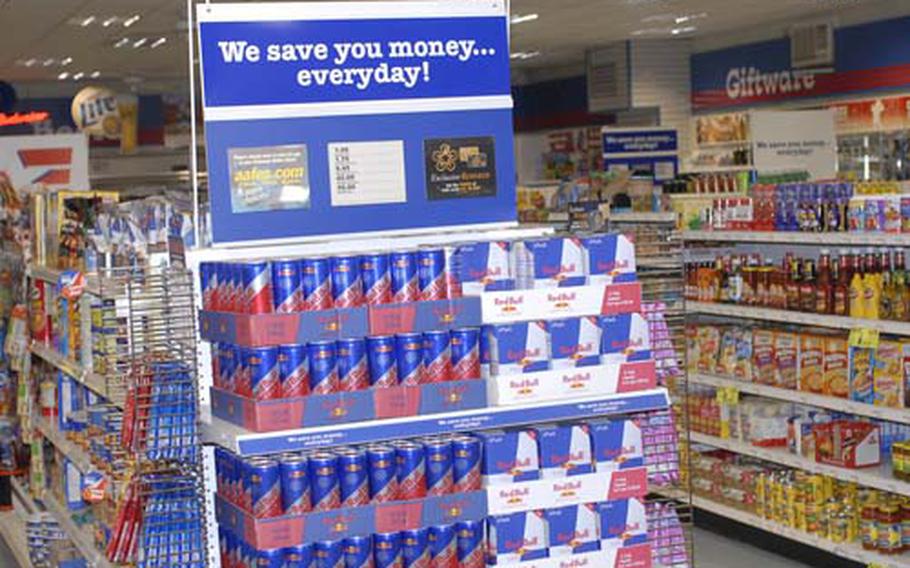
Worldwide sales of Red Bull and other energy drinks at Army and Air Force Exchange facilities climbed from about 950,000 units in 2006 to more than 2.47 million in 2008. Dentists and health experts worry about how those drinks can affect people’s health. (Mark Abramson / S&S)
While the U.S. Food and Drug Administration continues to investigate the role that energy drinks may have played in more than a dozen deaths, energy drinks have become the top-selling cold beverage at Army and Air Force general stores worldwide. We wondered — as physicians, one of whom is responsible for Defense Department medical policy in the Middle East — might our troops be at risk? But before we ask our elite special ops forces to pass on Monster Energy and start brewing chamomile tea, let’s consider the facts.
Energy drinks are mainly caffeine and sugar. Caffeine, at moderate doses, is safe and effective. Caffeine can help troops run longer and even improve reaction times. Researchers at the U.S. Army Research Institute of Environmental Medicine found that caffeine improved the ability of exhausted Navy SEALs to detect a faint glimmer of light on a computer monitor — a task similar to all-night sentry duty. Based on an extensive review of the literature, the Institute recommended that the military provide caffeine to soldiers to improve performance. The Army, in turn, provides carefully dosed caffeinated gum for its soldiers in combat.
So where might energy drinks go wrong? Caffeine, like any drug, has an upper limit to its efficacy and safety. When it comes to energy drinks, there’s no limit to the amount of caffeine that can be added, nor a requirement that the amount be disclosed. At high doses, caffeine can play havoc on the nervous system: nervous tremors, racing hearts and deteriorating cognitive performance.
Energy drinks sent 20,783 civilian men, women and children to hospital emergency rooms in 2011, an increase of 37 percent from 2010, according to a U.S. Department of Health and Human Services study published this year. Civilians may only require rest and intravenous fluids to recover from caffeine overdoses. But the consequences for our troops in combat, 45 percent of whom use energy drinks daily (according to a recent Centers for Disease Control and Prevention study), may be far more serious.
Energy drinks are often consumed with other performance enhancers, including caffeinated sports supplements and prescription stimulants. DOD recently funded testing of caffeinated supplements sold on military bases, the types of supplements that troops often combine with energy drinks, and found that less than half the labels provided accurate information about caffeine content. Testing of some individual capsules detected more caffeine than in four cups of coffee.
These caffeinated workout supplements and energy drinks often contain other stimulants as well. Just over a year ago, DOD pulled a dozen popular sports supplements from GNC stores on military bases because they contained unknown quantities of dimethylamylamine, a pharmaceutical stimulant as potent as ephedra.
In combat, these cocktails of energy drinks, workout supplements and prescription drugs can tip a troop over from just feeling on edge to having a full-fledged panic attack. A DOD study found that soldiers consuming sports supplements were more likely to seek medical attention for irregular heartbeats: Twenty percent of the troops were unable to promptly return to duty and 10 percent required aeromedical evacuation.
These evacuations from combat zones are not only risky for the patient. The evacuations in Black Hawk helicopters, at $2,500 an hour, expose aircrews to hostile fire and can delay critical care to combat victims on the battlefield.
What’s to be done? Ideally, the loopholes in the law should be closed to limit the amount of caffeine that can be added to any food or supplement, and to ensure that the amount of added caffeine is clearly indicated on the label. If these changes are made, our troops will be able to make informed decisions for themselves about the merit and safety of consuming energy drinks and sports supplements.
In the meantime, the Defense Department should not appear to tacitly endorse ineffective and hazardous performance-enhancers. Until the legal loopholes are closed, stores on military bases should sell only performance-enhancing products that DOD considers safe and effective — these might include caffeinated gum, creatine and some individual amino acids. Our warriors deserve nothing less.
Dr. Pieter Cohen is an assistant professor of medicine at Harvard Medical School. Dr. (Col.) Erin Edgar is command surgeon for U.S. Central Command.